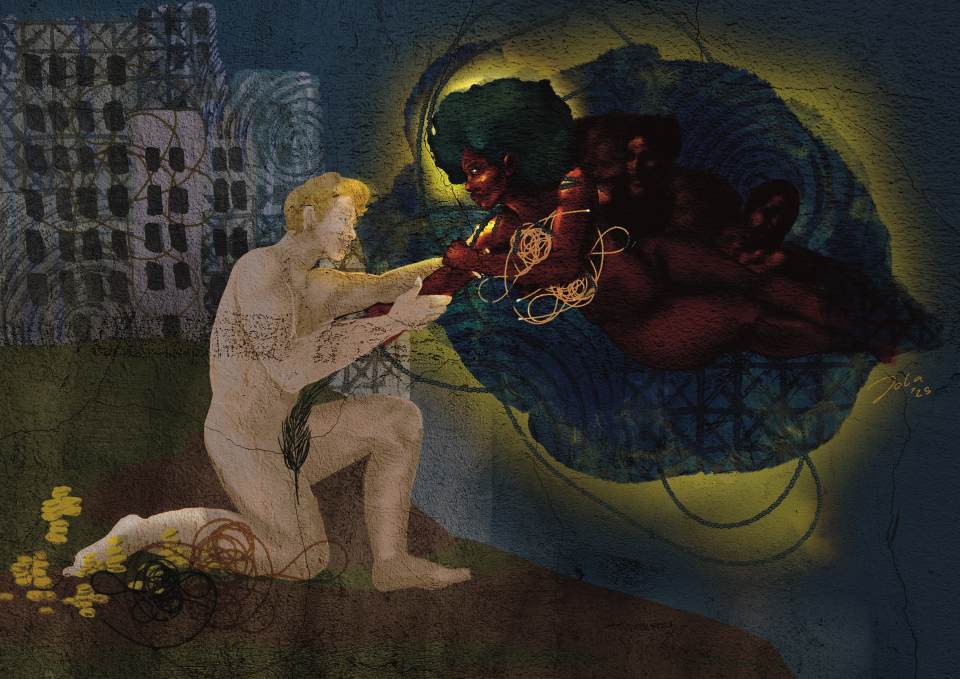Deep Recovery - Creative Response Competition
LU Arts and Radar ran a student competition in the spring term 2025 to encourage creative responses to Libita Sibungu's soundwork Deep Recovery.
About Deep Recovery
Artist Libita Sibungu’s work Deep Recovery (2023) is an evocative soundwork and risograph publication. It was commissioned by Radar, our contemporary art programme, and designed to be sited in archival spaces. It interrogates colonial archival practices, drawing on the artist's experiences in Cornwall and the British Geological Survey archives, and exploring themes of memory, identity, and the impermanence of landscapes.
From 10 February - 10 March 2025 it was located at Pilkington Library at Loughborough University for students, staff and members of the local community to access.
Read more about Deep Recovery on Radar's website
About the competition
To encourage students to access Deep Recovery and engage with its content, we launched a competition. Students were invited to explore the work and then submit a creative response in a format of their choosing which could include a piece of creative writing, a sound recording, a print, photograph or other format.
The entries were judged by a panel including Libita Sibungu and Lucy Lopez (Radar Curator).
The winner
'In Our Image' by Jola Ajiboye.
This beautiful digital collage and painting references Michelangelo's 'The Creation of Adam', retelling and reframing the story through the depiction of a black female figure as a symbol of Africa, and Adam as a symbol of the West.
The judging panel commended Jola's personal approach to their response and how their piece dealt with ideas of grief and ritual. They were also impressed by their thoughtful engagement with the colonial narrative of Deep Recovery.
Jola was awarded a cash prize.

"This piece is a personal and confrontational response to Libita Sibungu’s Deep Recovery. I was drawn to the work’s ritualistic quality — the way it weaves grief, ancestry, and resistance into something almost ceremonial. The line, “the bones of our ancestors are here, burned, pressed and spread with the wind,” struck me as a kind of magic grief ritual. It reminded me that history doesn’t disappear — it lingers in the soil, in memory, and in silence. It particularly resonated with my Nigerian heritage, as being an ex-colony of Britain and still having many of its artifacts in the British museum, I am all too familiar with the concept of the curated narrative construction that ultimately excludes black and brown people, land and resources, all of which were integral in building the First World.
In Our image is a digital collage and painting that boldly asserts claim on the West, referencing Michelangelo’s The Creation of Adam; it uses the moment of God breathing life into Adam and reframes it using a black female figure, serving as a symbol of Africa, and Adam serves as a symbol for the West. It states that without imperialism and slavery, the First World would not exist, thus how is the claim to it justified? Who belongs to the land? In Our image retells that story with a fluid, layered and uncertain landscape; its layered textures create a tactile sense of memory and time. The adorned patterns throughout the background serve as a metaphor for culture — drawn from Yoruba textile aesthetics — while the beads woven through the central figure symbolize ancestral wealth, spirituality, and identity.
At its core, this piece explores exchange — between past and present; spirit and body; memory and myth. It is a moment of reclamation, of spiritual return. And like Deep Recovery, it asks: what does it mean to recover what was buried — and who has the right to do so?"
Jola Ajiboye